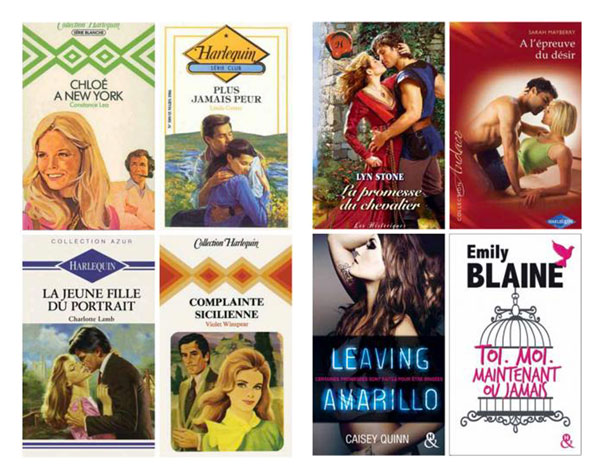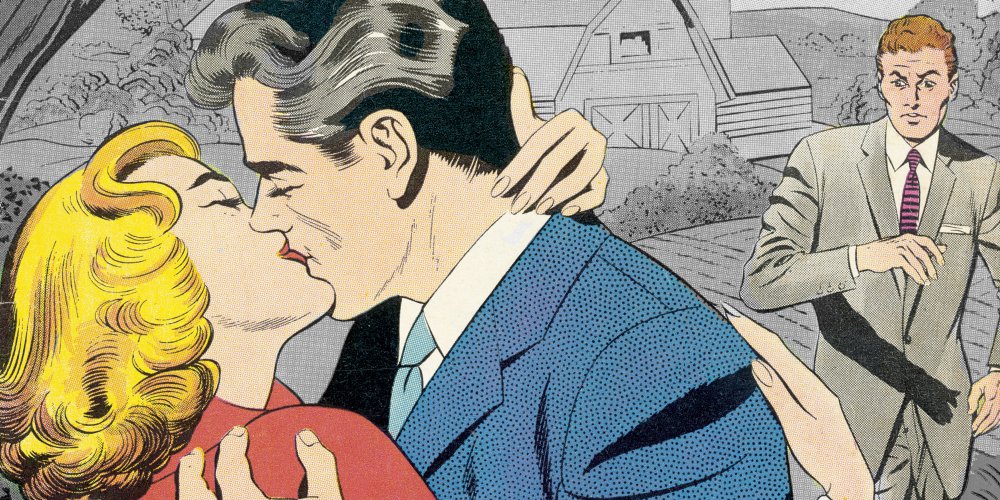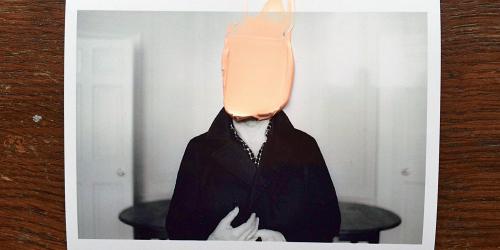A contemporary building at the pale mine, in a little glamorous corner of the 13th arrondissement of Paris. There, on the fourth floor, there is a glazed door, which is operated in a muffled ballet of studious women, the Parisian antenna of this office of dreams: the Harlequin Editions, which for more than fifty years have been racing generations of female hearts.
Harlequin with an Anglo-Saxon "H", since it all began in 1949 in Winnipeg, Canada, when Mary and Richard Bonnycastle created a publishing house under the banner of this multi-faceted character of the commedia dell'arte . One understands the symbol: to propose all kinds of works. In 1953, Mary urged her husband to publish a first novel called "medical" - a love story between a doctor and a nurse who will have to overcome a multitude of obstacles before conquering the heart of the "dark" practitioner. Immediate success, prelude to thousands of others, as many nuggets extracted from an inexhaustible gold mine: the romance blue flower with easily identifiable covers and the canvas as immutable as the rhythm of the seasons. A man, a woman, many ugly pitfalls, a few rivers of tears, a chaste kiss before the final fireworks with fiery embrace and promises of eternal love. An addictive pleasure for millions of Anglo-Saxon readers. The French women will have to wait until 1978 before discovering, with the publication of Complainte Sicilienne de Violet Winspear, these candy books with euphoric virtues that some spirits find cucul the praline, and acclaimed by seven million buyers in the Hexagon in 2015 .
I do not see how this would be contradictory with some intellectual background
Delegated editor of Harlequin France for fifteen years, Karine Lanini was not a priori not destined to be in this post. She is an author of letters, author of an eminent thesis on "vanity in the classical age", this former academic one day answers an announcement and finds herself embarked in the adventure of romance. Without states of mind. "I had read a lot, teenager, to relax, and I do not see how this would be contradictory with some intellectual baggage," she insists. His work: to restructure the teams by surrounding themselves with women graduates, increasingly privilege the original French texts to the translations. Ensuring compliance with an inflexible charter? "No specification only requires that the woman and the man meet on page 2, sleep together on page 25, separate on page 96 and find themselves on page 127. The only criterion: l Love must be impossible at the beginning and possible in the end. With a happy ending and the most obstacles imaginable. Otherwise there is no history. "
Editions Harlequin: the important thing is that it ends well
Harlequin France translates half of what the Canadian parent publishes. Each book remains on sale for a month, in the same way as a monthly magazine. In order to catch a young readership that no longer recognizes itself in the kitsch representation of the young woman revolving around the mysterious bellast, the mythical collection "Passion", which represented another fifteen years ago 90% of the production, sees little by little its square meadow invaded by a myriad of satellites. "Along with traditional romance with male alpha heroes, beautiful, mysterious and rich, and extremely fanciful heroines, Karine Lanini describes, we develop historical, romantic, suspense, paranormal and even" new adult "collections. Stories of bad tattooed bad guys and very addicted who end up following the path of love and redemption with good girls. "
Sometimes this Harlequin gore variety goes away. Very far. At the risk of turning the Bonnycastle couple back to his grave. Thus, the heroine of Never forget (published in March 2017) was kidnapped, adolescent, by a psychopath and violated, before being delivered by the own son of the monster. Years later, when she goes on TV to tell her nightmare, the son decides to get back in touch with her. Love finally stretched out their arms. "It is not easy to fall in love with the son of his executioner, laconically concedes Karine Lanini, but the important thing, at Harlequin, is that it ends well. "
The prude Harlequin is henceforth in the air without cache-sexe
But the novelty is the exponential development of different formats with, for half of the production, French authors. "With around forty new products a month and as many translations, also available on subscription, we do not stop," says Marianne Zankel, head of marketing. Result: six hundred books a year, a good part in digital publication, sometimes with another possible end, in interaction. This is not a simple dusting: the prude Harlequin is henceforth in the air without cache-sex. Raw episodes that the readers plebiscite and prefer to name (a little hypocritically) "graphic scenes". A Copernican revolution begun by the phenomenal success of Fifty shades of Gray, published by a competitor: the romance suddenly became trend, provided to spice pornographic sequences the progression of the idyll. The "graphic" of situations is no longer suggested but described in a very explicit way. Example from Dark romance by Penelope Douglas (February 2017): "I shouted as he slid his sex, centimeter by centimeter, into me. He was so hard! My flesh was distended; it was a bit painful, but so good! I felt him penetrate deep inside my belly. "The" harlequinades "of today, like fashionable television series, also cultivate the" cliffhanger ", an open end meant to make addictive the reading of a variation in several volumes.
 The evolution of the covers and collections of Harlequin @ DR
The evolution of the covers and collections of Harlequin @ DR
Editions Harlequin: sweet titles lined up like a huge poem
In order to measure the editorial importance of Harlequin, he directs the basement where, behind an armored door, lies an extraordinary romantic treasure: the thousands of works published in France for nearly forty years. Sweet titles lined up like an immense poem as absurd as it is cunning with the airs of exquisite Surrealist corpse. From blankets to naive illustrations of browns with square jaws and reassuring shoulders behind which are ambushed young blond girls with modest pose with a je ne sais quoi decided in the look. In this vintage wine cellar, Storm-colored eyes are somnolled near Trapped by fate, The child of his enemy, alongside Such a long wait, and Plot in love, not far from A happiness for two.
In 2013, in order to find local talents, Harlequin France decided to organize a contest of recruitment of feathers hundred percent hexagonal. For example, Emily Blaine, an Anglo-Saxon pseudonym chosen by this human resources coach and organizer of seminars at the SNCF, was discovered among the thousands of candidates sent by e-mails. also Angela Morelli (a pseudonym, there too), former professor of letters with a singing accent. Having sold two hundred and fifty thousand copies of her books to date, Emily Blaine caused quasi-riots in the salons where she went and played the same number of signatures with Marc Levy or Guillaume Musso.
The Harlequin line, today, books that bring balm to the heart
Rendez-vous with this playful and solar thirty-year-old during a session of work on its next text with Sophie Lagriffol, its editor, which addresses "the center of gravity of the novel". It is a question of giving a larger part to the hero, in order to obtain "asperities in the text to cling to." One could almost think of a reading committee of The NRF. After pointing out the improbabilities, words tote and tics of language, Sophie will be responsible for bringing "the touch of cosmetics, the small shine that shines".
Explanation of the author of You, now or never: "I write therapeutic literature. When my readers close one of my books, they have banana and fall asleep the mind lighter. Many write to me: "I feel better after reading." "To do good to people, a credo taken up by Angéla Morelli, author of The ideal meeting (or almost):" I invent stories with problems of women who seek themselves, the love story is secondary. It started like that staged a bachelor who rowed. The Harlequin line, today, are "feel good books", books that brighten the heart. One is no longer in fantasy romance with billionaires. "
In the end it is always the woman who wins
The service potion waiting for the prince charming deigns to pluck it is definitely corrupted? Without a shadow of a doubt in the eyes of Emmanuelle Bucco-Cancès, director general of HarperCollins France, owner of Harlequin Editions: "Our heroines must imperatively valorize women. Generally, in the end it is always the woman who wins by taking the man in his vision of the world and love. We try, in our way, to shake up morality: a girl may very well fall in love with her half-brother. The first large-format romance we published told the story of two lesbians in love at the London Olympics. We are not in the vanguard of feminist demands, but we accompany the evolutions of society. "
Peggy Heronneau, from the Chantelivre bookshop in Issy-les-Moulineaux, notes that "the romances we sell most do not center their intrigues on man and the love story that flows from it, but on women and his desires for change, ready to start a new life, after a layoff or a family dish. A casual, unpretentious and not stupid literature that allows to have a good time. Like a little mint-colored bandage to the water.


